Psychology: Person-Centred Care for Elderly Individuals
VerifiedAdded on 2023/01/18
|15
|3253
|52
AI Summary
This article discusses the importance of person-centred care for elderly individuals, focusing on their unique needs and challenges. It explores the impact of social isolation, visual impairment, and loneliness on their well-being and quality of life. The article also suggests interventions such as group-based activities, community support, and home care services to address these issues.
Contribute Materials
Your contribution can guide someone’s learning journey. Share your
documents today.

Running head: PSYCHOLOGY
PSYCHOLOGY
Name of the Student
Name of the university
Author’s note
PSYCHOLOGY
Name of the Student
Name of the university
Author’s note
Secure Best Marks with AI Grader
Need help grading? Try our AI Grader for instant feedback on your assignments.
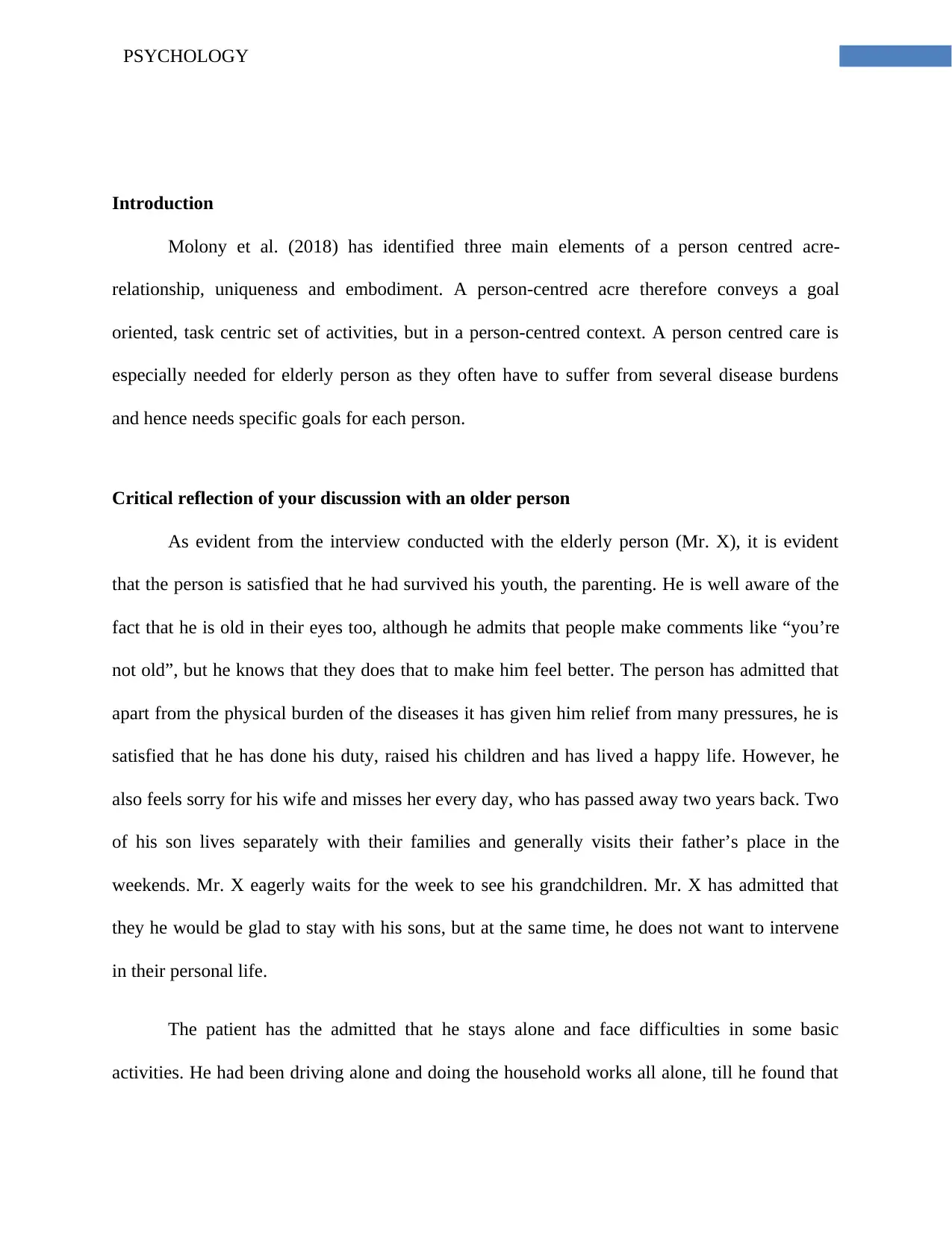
PSYCHOLOGY
Introduction
Molony et al. (2018) has identified three main elements of a person centred acre-
relationship, uniqueness and embodiment. A person-centred acre therefore conveys a goal
oriented, task centric set of activities, but in a person-centred context. A person centred care is
especially needed for elderly person as they often have to suffer from several disease burdens
and hence needs specific goals for each person.
Critical reflection of your discussion with an older person
As evident from the interview conducted with the elderly person (Mr. X), it is evident
that the person is satisfied that he had survived his youth, the parenting. He is well aware of the
fact that he is old in their eyes too, although he admits that people make comments like “you’re
not old”, but he knows that they does that to make him feel better. The person has admitted that
apart from the physical burden of the diseases it has given him relief from many pressures, he is
satisfied that he has done his duty, raised his children and has lived a happy life. However, he
also feels sorry for his wife and misses her every day, who has passed away two years back. Two
of his son lives separately with their families and generally visits their father’s place in the
weekends. Mr. X eagerly waits for the week to see his grandchildren. Mr. X has admitted that
they he would be glad to stay with his sons, but at the same time, he does not want to intervene
in their personal life.
The patient has the admitted that he stays alone and face difficulties in some basic
activities. He had been driving alone and doing the household works all alone, till he found that
Introduction
Molony et al. (2018) has identified three main elements of a person centred acre-
relationship, uniqueness and embodiment. A person-centred acre therefore conveys a goal
oriented, task centric set of activities, but in a person-centred context. A person centred care is
especially needed for elderly person as they often have to suffer from several disease burdens
and hence needs specific goals for each person.
Critical reflection of your discussion with an older person
As evident from the interview conducted with the elderly person (Mr. X), it is evident
that the person is satisfied that he had survived his youth, the parenting. He is well aware of the
fact that he is old in their eyes too, although he admits that people make comments like “you’re
not old”, but he knows that they does that to make him feel better. The person has admitted that
apart from the physical burden of the diseases it has given him relief from many pressures, he is
satisfied that he has done his duty, raised his children and has lived a happy life. However, he
also feels sorry for his wife and misses her every day, who has passed away two years back. Two
of his son lives separately with their families and generally visits their father’s place in the
weekends. Mr. X eagerly waits for the week to see his grandchildren. Mr. X has admitted that
they he would be glad to stay with his sons, but at the same time, he does not want to intervene
in their personal life.
The patient has the admitted that he stays alone and face difficulties in some basic
activities. He had been driving alone and doing the household works all alone, till he found that
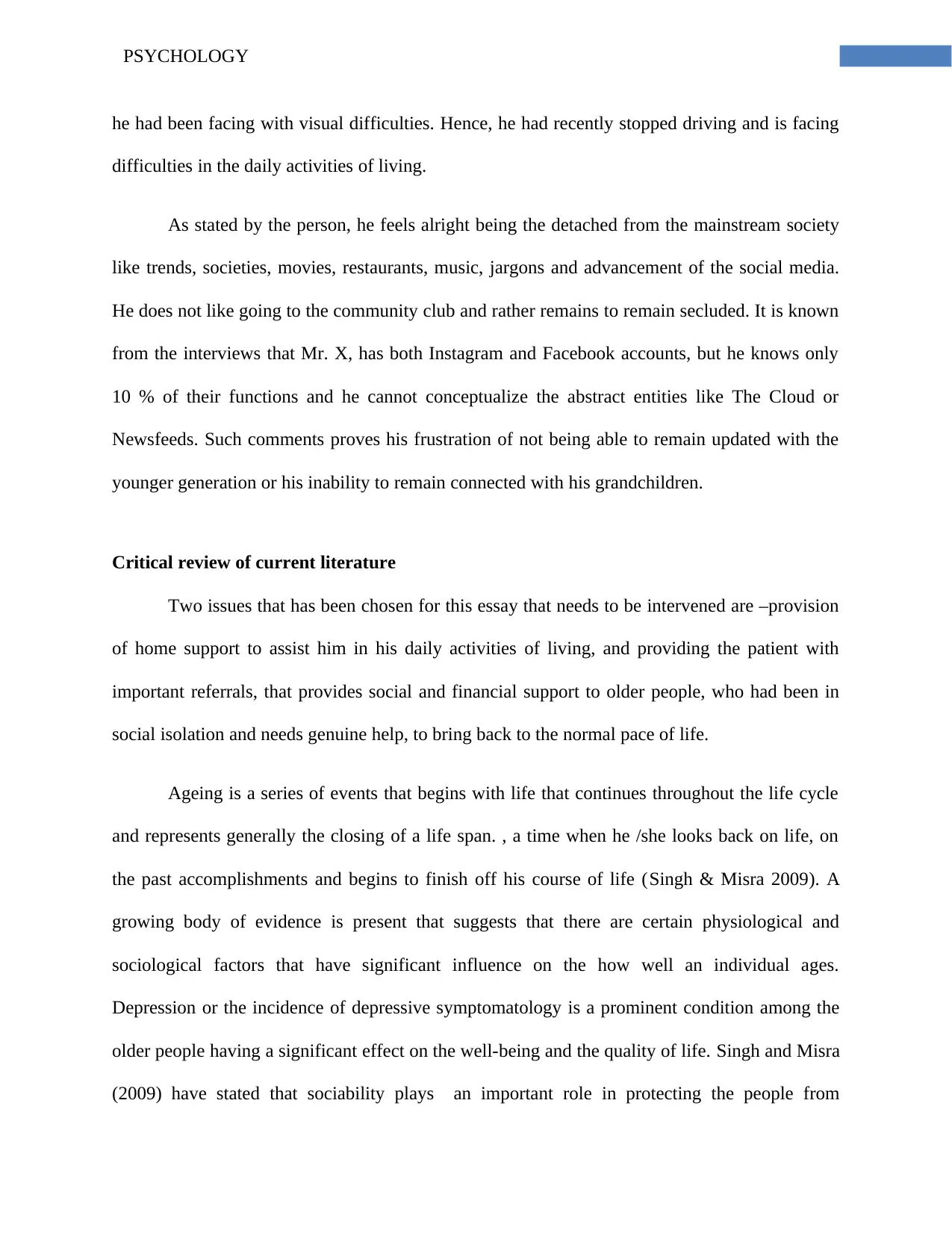
PSYCHOLOGY
he had been facing with visual difficulties. Hence, he had recently stopped driving and is facing
difficulties in the daily activities of living.
As stated by the person, he feels alright being the detached from the mainstream society
like trends, societies, movies, restaurants, music, jargons and advancement of the social media.
He does not like going to the community club and rather remains to remain secluded. It is known
from the interviews that Mr. X, has both Instagram and Facebook accounts, but he knows only
10 % of their functions and he cannot conceptualize the abstract entities like The Cloud or
Newsfeeds. Such comments proves his frustration of not being able to remain updated with the
younger generation or his inability to remain connected with his grandchildren.
Critical review of current literature
Two issues that has been chosen for this essay that needs to be intervened are –provision
of home support to assist him in his daily activities of living, and providing the patient with
important referrals, that provides social and financial support to older people, who had been in
social isolation and needs genuine help, to bring back to the normal pace of life.
Ageing is a series of events that begins with life that continues throughout the life cycle
and represents generally the closing of a life span. , a time when he /she looks back on life, on
the past accomplishments and begins to finish off his course of life (Singh & Misra 2009). A
growing body of evidence is present that suggests that there are certain physiological and
sociological factors that have significant influence on the how well an individual ages.
Depression or the incidence of depressive symptomatology is a prominent condition among the
older people having a significant effect on the well-being and the quality of life. Singh and Misra
(2009) have stated that sociability plays an important role in protecting the people from
he had been facing with visual difficulties. Hence, he had recently stopped driving and is facing
difficulties in the daily activities of living.
As stated by the person, he feels alright being the detached from the mainstream society
like trends, societies, movies, restaurants, music, jargons and advancement of the social media.
He does not like going to the community club and rather remains to remain secluded. It is known
from the interviews that Mr. X, has both Instagram and Facebook accounts, but he knows only
10 % of their functions and he cannot conceptualize the abstract entities like The Cloud or
Newsfeeds. Such comments proves his frustration of not being able to remain updated with the
younger generation or his inability to remain connected with his grandchildren.
Critical review of current literature
Two issues that has been chosen for this essay that needs to be intervened are –provision
of home support to assist him in his daily activities of living, and providing the patient with
important referrals, that provides social and financial support to older people, who had been in
social isolation and needs genuine help, to bring back to the normal pace of life.
Ageing is a series of events that begins with life that continues throughout the life cycle
and represents generally the closing of a life span. , a time when he /she looks back on life, on
the past accomplishments and begins to finish off his course of life (Singh & Misra 2009). A
growing body of evidence is present that suggests that there are certain physiological and
sociological factors that have significant influence on the how well an individual ages.
Depression or the incidence of depressive symptomatology is a prominent condition among the
older people having a significant effect on the well-being and the quality of life. Singh and Misra
(2009) have stated that sociability plays an important role in protecting the people from
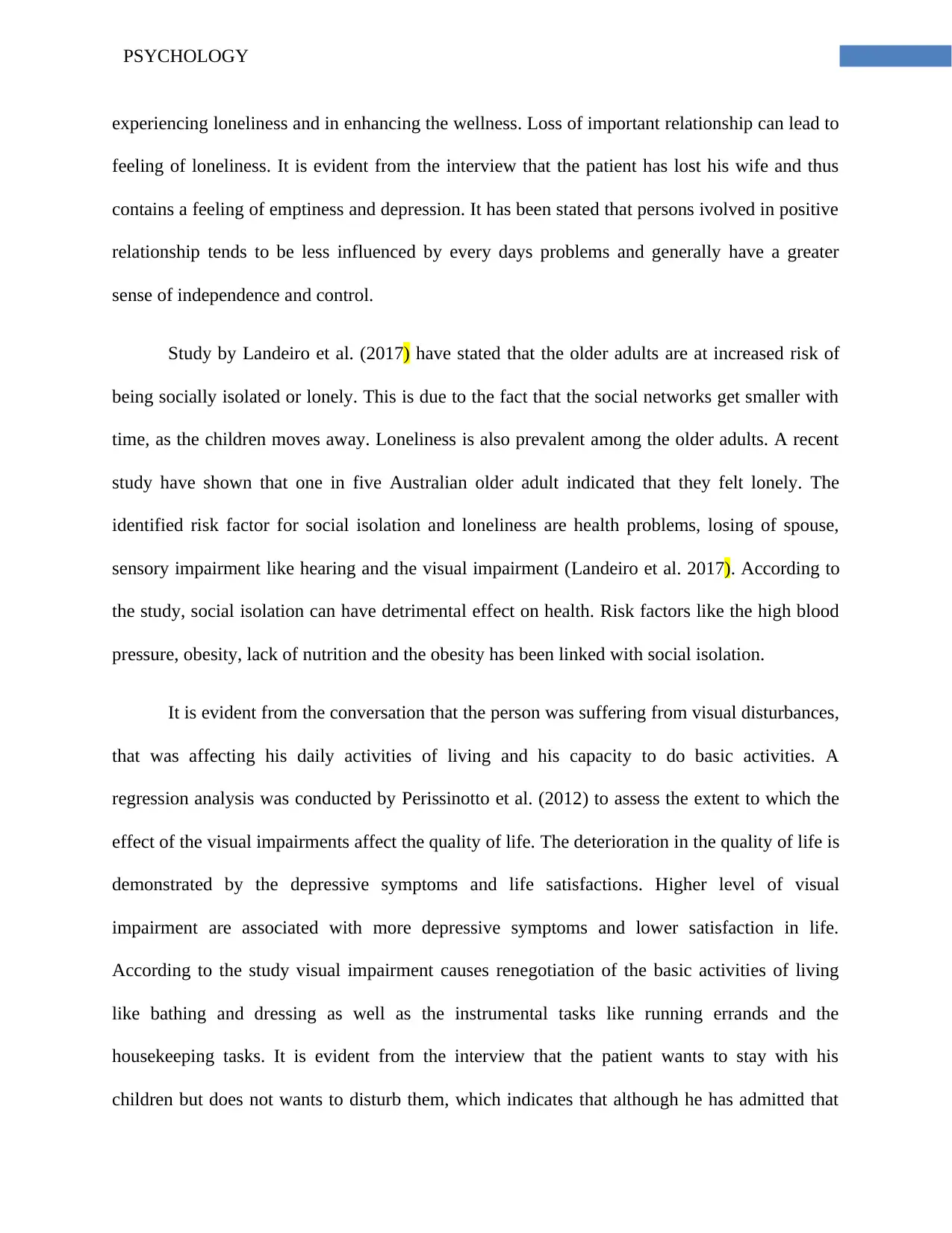
PSYCHOLOGY
experiencing loneliness and in enhancing the wellness. Loss of important relationship can lead to
feeling of loneliness. It is evident from the interview that the patient has lost his wife and thus
contains a feeling of emptiness and depression. It has been stated that persons ivolved in positive
relationship tends to be less influenced by every days problems and generally have a greater
sense of independence and control.
Study by Landeiro et al. (2017) have stated that the older adults are at increased risk of
being socially isolated or lonely. This is due to the fact that the social networks get smaller with
time, as the children moves away. Loneliness is also prevalent among the older adults. A recent
study have shown that one in five Australian older adult indicated that they felt lonely. The
identified risk factor for social isolation and loneliness are health problems, losing of spouse,
sensory impairment like hearing and the visual impairment (Landeiro et al. 2017). According to
the study, social isolation can have detrimental effect on health. Risk factors like the high blood
pressure, obesity, lack of nutrition and the obesity has been linked with social isolation.
It is evident from the conversation that the person was suffering from visual disturbances,
that was affecting his daily activities of living and his capacity to do basic activities. A
regression analysis was conducted by Perissinotto et al. (2012) to assess the extent to which the
effect of the visual impairments affect the quality of life. The deterioration in the quality of life is
demonstrated by the depressive symptoms and life satisfactions. Higher level of visual
impairment are associated with more depressive symptoms and lower satisfaction in life.
According to the study visual impairment causes renegotiation of the basic activities of living
like bathing and dressing as well as the instrumental tasks like running errands and the
housekeeping tasks. It is evident from the interview that the patient wants to stay with his
children but does not wants to disturb them, which indicates that although he has admitted that
experiencing loneliness and in enhancing the wellness. Loss of important relationship can lead to
feeling of loneliness. It is evident from the interview that the patient has lost his wife and thus
contains a feeling of emptiness and depression. It has been stated that persons ivolved in positive
relationship tends to be less influenced by every days problems and generally have a greater
sense of independence and control.
Study by Landeiro et al. (2017) have stated that the older adults are at increased risk of
being socially isolated or lonely. This is due to the fact that the social networks get smaller with
time, as the children moves away. Loneliness is also prevalent among the older adults. A recent
study have shown that one in five Australian older adult indicated that they felt lonely. The
identified risk factor for social isolation and loneliness are health problems, losing of spouse,
sensory impairment like hearing and the visual impairment (Landeiro et al. 2017). According to
the study, social isolation can have detrimental effect on health. Risk factors like the high blood
pressure, obesity, lack of nutrition and the obesity has been linked with social isolation.
It is evident from the conversation that the person was suffering from visual disturbances,
that was affecting his daily activities of living and his capacity to do basic activities. A
regression analysis was conducted by Perissinotto et al. (2012) to assess the extent to which the
effect of the visual impairments affect the quality of life. The deterioration in the quality of life is
demonstrated by the depressive symptoms and life satisfactions. Higher level of visual
impairment are associated with more depressive symptoms and lower satisfaction in life.
According to the study visual impairment causes renegotiation of the basic activities of living
like bathing and dressing as well as the instrumental tasks like running errands and the
housekeeping tasks. It is evident from the interview that the patient wants to stay with his
children but does not wants to disturb them, which indicates that although he has admitted that
Paraphrase This Document
Need a fresh take? Get an instant paraphrase of this document with our AI Paraphraser
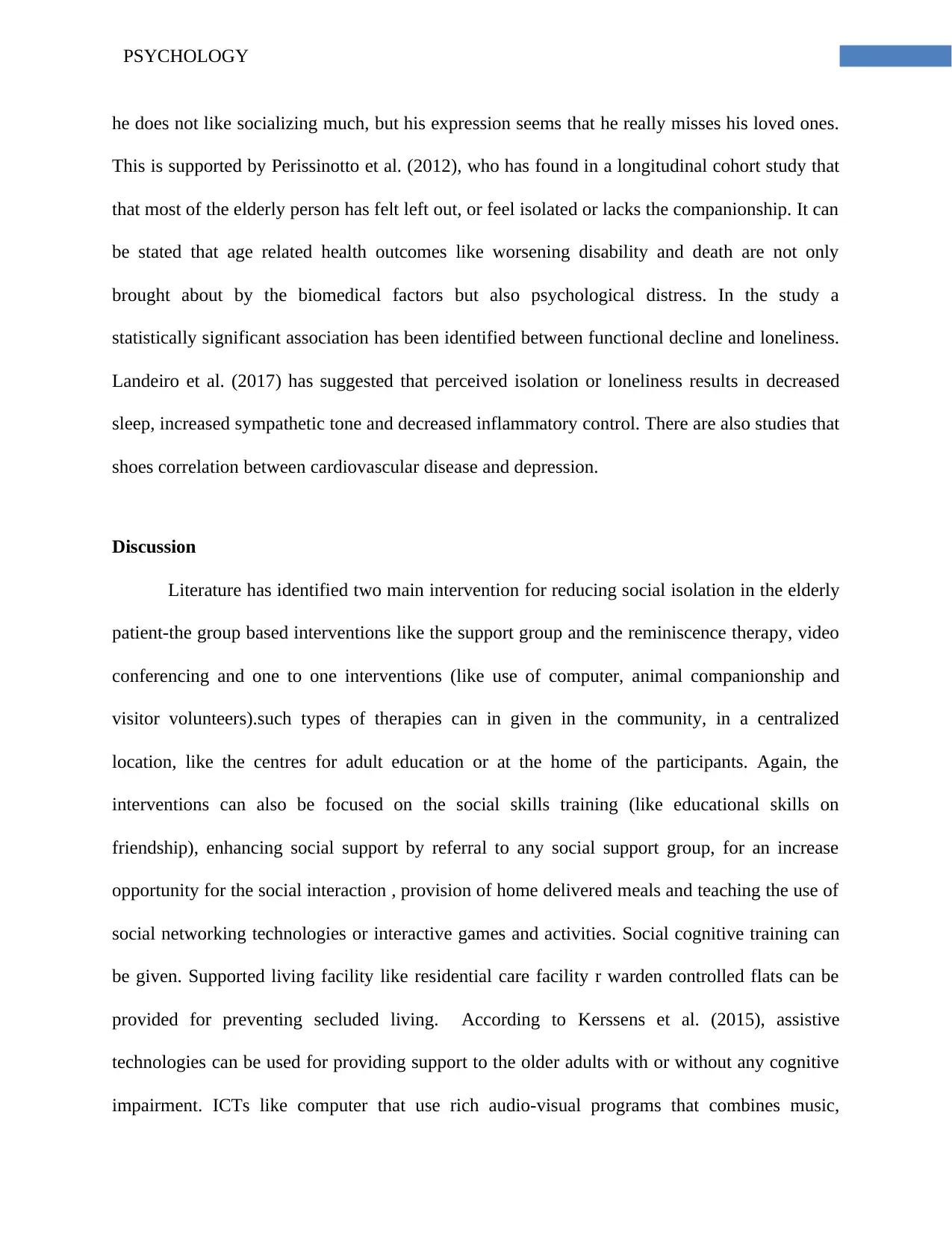
PSYCHOLOGY
he does not like socializing much, but his expression seems that he really misses his loved ones.
This is supported by Perissinotto et al. (2012), who has found in a longitudinal cohort study that
that most of the elderly person has felt left out, or feel isolated or lacks the companionship. It can
be stated that age related health outcomes like worsening disability and death are not only
brought about by the biomedical factors but also psychological distress. In the study a
statistically significant association has been identified between functional decline and loneliness.
Landeiro et al. (2017) has suggested that perceived isolation or loneliness results in decreased
sleep, increased sympathetic tone and decreased inflammatory control. There are also studies that
shoes correlation between cardiovascular disease and depression.
Discussion
Literature has identified two main intervention for reducing social isolation in the elderly
patient-the group based interventions like the support group and the reminiscence therapy, video
conferencing and one to one interventions (like use of computer, animal companionship and
visitor volunteers).such types of therapies can in given in the community, in a centralized
location, like the centres for adult education or at the home of the participants. Again, the
interventions can also be focused on the social skills training (like educational skills on
friendship), enhancing social support by referral to any social support group, for an increase
opportunity for the social interaction , provision of home delivered meals and teaching the use of
social networking technologies or interactive games and activities. Social cognitive training can
be given. Supported living facility like residential care facility r warden controlled flats can be
provided for preventing secluded living. According to Kerssens et al. (2015), assistive
technologies can be used for providing support to the older adults with or without any cognitive
impairment. ICTs like computer that use rich audio-visual programs that combines music,
he does not like socializing much, but his expression seems that he really misses his loved ones.
This is supported by Perissinotto et al. (2012), who has found in a longitudinal cohort study that
that most of the elderly person has felt left out, or feel isolated or lacks the companionship. It can
be stated that age related health outcomes like worsening disability and death are not only
brought about by the biomedical factors but also psychological distress. In the study a
statistically significant association has been identified between functional decline and loneliness.
Landeiro et al. (2017) has suggested that perceived isolation or loneliness results in decreased
sleep, increased sympathetic tone and decreased inflammatory control. There are also studies that
shoes correlation between cardiovascular disease and depression.
Discussion
Literature has identified two main intervention for reducing social isolation in the elderly
patient-the group based interventions like the support group and the reminiscence therapy, video
conferencing and one to one interventions (like use of computer, animal companionship and
visitor volunteers).such types of therapies can in given in the community, in a centralized
location, like the centres for adult education or at the home of the participants. Again, the
interventions can also be focused on the social skills training (like educational skills on
friendship), enhancing social support by referral to any social support group, for an increase
opportunity for the social interaction , provision of home delivered meals and teaching the use of
social networking technologies or interactive games and activities. Social cognitive training can
be given. Supported living facility like residential care facility r warden controlled flats can be
provided for preventing secluded living. According to Kerssens et al. (2015), assistive
technologies can be used for providing support to the older adults with or without any cognitive
impairment. ICTs like computer that use rich audio-visual programs that combines music,
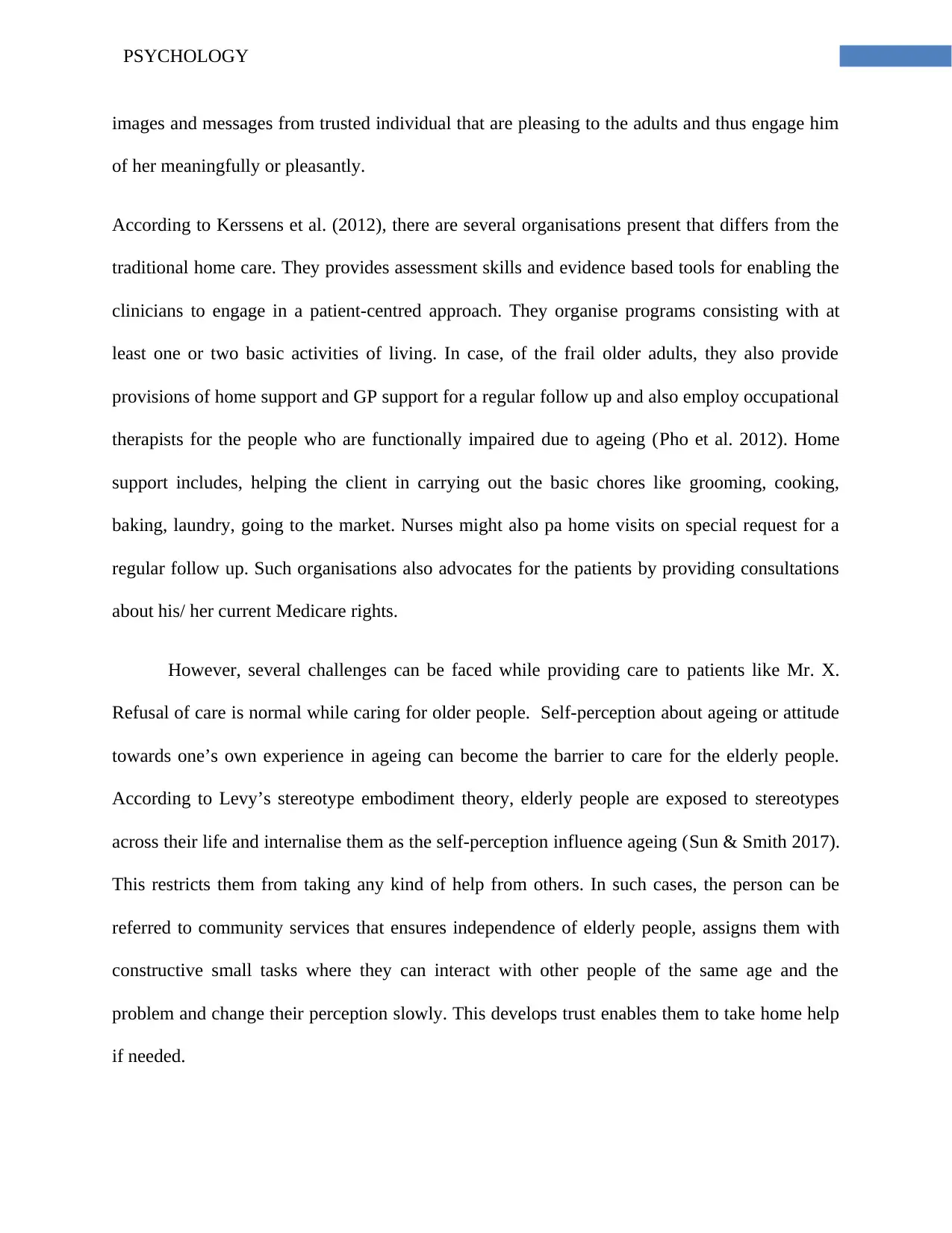
PSYCHOLOGY
images and messages from trusted individual that are pleasing to the adults and thus engage him
of her meaningfully or pleasantly.
According to Kerssens et al. (2012), there are several organisations present that differs from the
traditional home care. They provides assessment skills and evidence based tools for enabling the
clinicians to engage in a patient-centred approach. They organise programs consisting with at
least one or two basic activities of living. In case, of the frail older adults, they also provide
provisions of home support and GP support for a regular follow up and also employ occupational
therapists for the people who are functionally impaired due to ageing (Pho et al. 2012). Home
support includes, helping the client in carrying out the basic chores like grooming, cooking,
baking, laundry, going to the market. Nurses might also pa home visits on special request for a
regular follow up. Such organisations also advocates for the patients by providing consultations
about his/ her current Medicare rights.
However, several challenges can be faced while providing care to patients like Mr. X.
Refusal of care is normal while caring for older people. Self-perception about ageing or attitude
towards one’s own experience in ageing can become the barrier to care for the elderly people.
According to Levy’s stereotype embodiment theory, elderly people are exposed to stereotypes
across their life and internalise them as the self-perception influence ageing (Sun & Smith 2017).
This restricts them from taking any kind of help from others. In such cases, the person can be
referred to community services that ensures independence of elderly people, assigns them with
constructive small tasks where they can interact with other people of the same age and the
problem and change their perception slowly. This develops trust enables them to take home help
if needed.
images and messages from trusted individual that are pleasing to the adults and thus engage him
of her meaningfully or pleasantly.
According to Kerssens et al. (2012), there are several organisations present that differs from the
traditional home care. They provides assessment skills and evidence based tools for enabling the
clinicians to engage in a patient-centred approach. They organise programs consisting with at
least one or two basic activities of living. In case, of the frail older adults, they also provide
provisions of home support and GP support for a regular follow up and also employ occupational
therapists for the people who are functionally impaired due to ageing (Pho et al. 2012). Home
support includes, helping the client in carrying out the basic chores like grooming, cooking,
baking, laundry, going to the market. Nurses might also pa home visits on special request for a
regular follow up. Such organisations also advocates for the patients by providing consultations
about his/ her current Medicare rights.
However, several challenges can be faced while providing care to patients like Mr. X.
Refusal of care is normal while caring for older people. Self-perception about ageing or attitude
towards one’s own experience in ageing can become the barrier to care for the elderly people.
According to Levy’s stereotype embodiment theory, elderly people are exposed to stereotypes
across their life and internalise them as the self-perception influence ageing (Sun & Smith 2017).
This restricts them from taking any kind of help from others. In such cases, the person can be
referred to community services that ensures independence of elderly people, assigns them with
constructive small tasks where they can interact with other people of the same age and the
problem and change their perception slowly. This develops trust enables them to take home help
if needed.
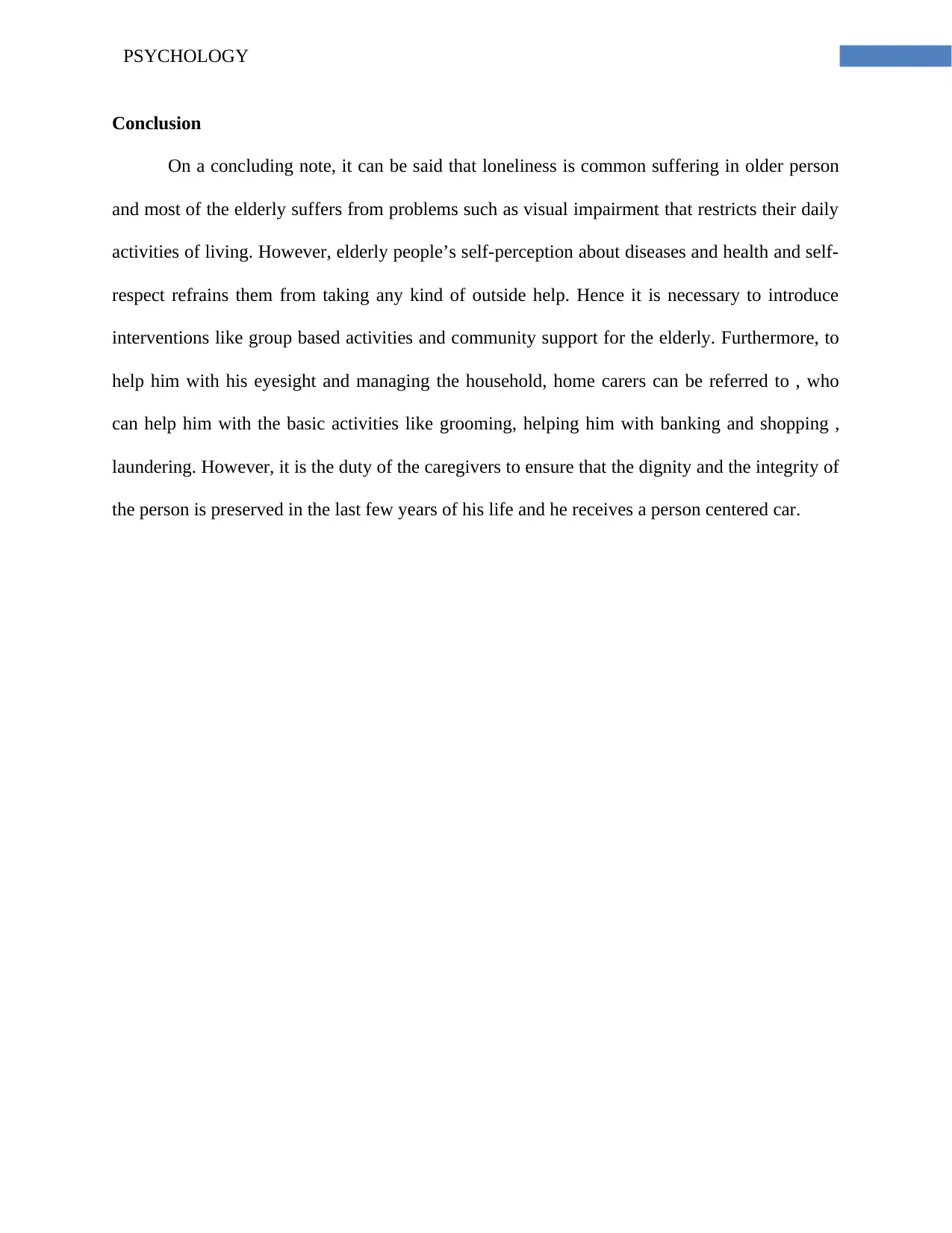
PSYCHOLOGY
Conclusion
On a concluding note, it can be said that loneliness is common suffering in older person
and most of the elderly suffers from problems such as visual impairment that restricts their daily
activities of living. However, elderly people’s self-perception about diseases and health and self-
respect refrains them from taking any kind of outside help. Hence it is necessary to introduce
interventions like group based activities and community support for the elderly. Furthermore, to
help him with his eyesight and managing the household, home carers can be referred to , who
can help him with the basic activities like grooming, helping him with banking and shopping ,
laundering. However, it is the duty of the caregivers to ensure that the dignity and the integrity of
the person is preserved in the last few years of his life and he receives a person centered car.
Conclusion
On a concluding note, it can be said that loneliness is common suffering in older person
and most of the elderly suffers from problems such as visual impairment that restricts their daily
activities of living. However, elderly people’s self-perception about diseases and health and self-
respect refrains them from taking any kind of outside help. Hence it is necessary to introduce
interventions like group based activities and community support for the elderly. Furthermore, to
help him with his eyesight and managing the household, home carers can be referred to , who
can help him with the basic activities like grooming, helping him with banking and shopping ,
laundering. However, it is the duty of the caregivers to ensure that the dignity and the integrity of
the person is preserved in the last few years of his life and he receives a person centered car.
Secure Best Marks with AI Grader
Need help grading? Try our AI Grader for instant feedback on your assignments.
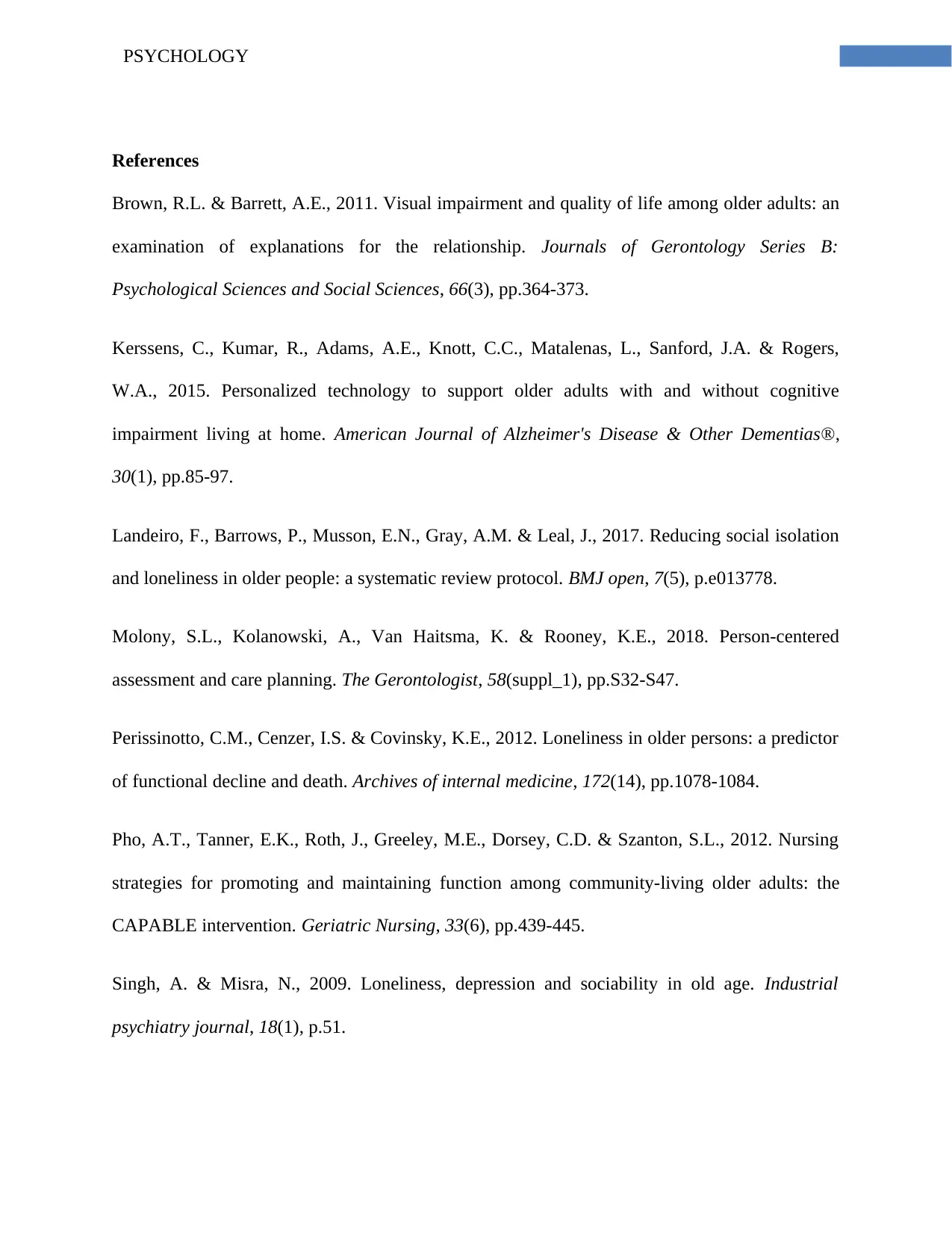
PSYCHOLOGY
References
Brown, R.L. & Barrett, A.E., 2011. Visual impairment and quality of life among older adults: an
examination of explanations for the relationship. Journals of Gerontology Series B:
Psychological Sciences and Social Sciences, 66(3), pp.364-373.
Kerssens, C., Kumar, R., Adams, A.E., Knott, C.C., Matalenas, L., Sanford, J.A. & Rogers,
W.A., 2015. Personalized technology to support older adults with and without cognitive
impairment living at home. American Journal of Alzheimer's Disease & Other Dementias®,
30(1), pp.85-97.
Landeiro, F., Barrows, P., Musson, E.N., Gray, A.M. & Leal, J., 2017. Reducing social isolation
and loneliness in older people: a systematic review protocol. BMJ open, 7(5), p.e013778.
Molony, S.L., Kolanowski, A., Van Haitsma, K. & Rooney, K.E., 2018. Person-centered
assessment and care planning. The Gerontologist, 58(suppl_1), pp.S32-S47.
Perissinotto, C.M., Cenzer, I.S. & Covinsky, K.E., 2012. Loneliness in older persons: a predictor
of functional decline and death. Archives of internal medicine, 172(14), pp.1078-1084.
Pho, A.T., Tanner, E.K., Roth, J., Greeley, M.E., Dorsey, C.D. & Szanton, S.L., 2012. Nursing
strategies for promoting and maintaining function among community-living older adults: the
CAPABLE intervention. Geriatric Nursing, 33(6), pp.439-445.
Singh, A. & Misra, N., 2009. Loneliness, depression and sociability in old age. Industrial
psychiatry journal, 18(1), p.51.
References
Brown, R.L. & Barrett, A.E., 2011. Visual impairment and quality of life among older adults: an
examination of explanations for the relationship. Journals of Gerontology Series B:
Psychological Sciences and Social Sciences, 66(3), pp.364-373.
Kerssens, C., Kumar, R., Adams, A.E., Knott, C.C., Matalenas, L., Sanford, J.A. & Rogers,
W.A., 2015. Personalized technology to support older adults with and without cognitive
impairment living at home. American Journal of Alzheimer's Disease & Other Dementias®,
30(1), pp.85-97.
Landeiro, F., Barrows, P., Musson, E.N., Gray, A.M. & Leal, J., 2017. Reducing social isolation
and loneliness in older people: a systematic review protocol. BMJ open, 7(5), p.e013778.
Molony, S.L., Kolanowski, A., Van Haitsma, K. & Rooney, K.E., 2018. Person-centered
assessment and care planning. The Gerontologist, 58(suppl_1), pp.S32-S47.
Perissinotto, C.M., Cenzer, I.S. & Covinsky, K.E., 2012. Loneliness in older persons: a predictor
of functional decline and death. Archives of internal medicine, 172(14), pp.1078-1084.
Pho, A.T., Tanner, E.K., Roth, J., Greeley, M.E., Dorsey, C.D. & Szanton, S.L., 2012. Nursing
strategies for promoting and maintaining function among community-living older adults: the
CAPABLE intervention. Geriatric Nursing, 33(6), pp.439-445.
Singh, A. & Misra, N., 2009. Loneliness, depression and sociability in old age. Industrial
psychiatry journal, 18(1), p.51.

PSYCHOLOGY
Sun, J.K. & Smith, J., 2017. Self-perceptions of aging and perceived barriers to care: Reasons for
health care delay. The Gerontologist, 57(suppl_2), pp.S216-S226.
Appendices
Appendix A
1. Can you share something about yourself? Have you yourself realized that you have
grown older ?
Ans: Yes, of course. I am enjoying it. Everyone has to get to this phase. I believe, that I
have accomplished all my duties and I am satisfied with my life.
2. What are some of the best things about growing older for you?
Ans: Well, you can get to see you grandchildren. Well, I miss my wife and I am reaching the
time when we will be together again. She passed three years back.
3. What are some of the hardest things you have found in relation to growing older?
Ans: My sons stays in other stays in other cities, so I do not get to see my grandchildren
often. I want to spend more time with them. I know there are busy, I don’t want to intervene.
It is not that they want me to stay with them, but I don’t want to interfere and I love to spend
some time alone, with the memories. I have my friends out here.
4. Do you face any difficulties? As you have said you have grown older?
Ans: Well , I am having some problems, with my eyesight. So, I have stopped driving. I
could not go to the bank yesterday.
5. What is important for you now and into the future? Do you foresee any need for support
in achieving these goals?
Sun, J.K. & Smith, J., 2017. Self-perceptions of aging and perceived barriers to care: Reasons for
health care delay. The Gerontologist, 57(suppl_2), pp.S216-S226.
Appendices
Appendix A
1. Can you share something about yourself? Have you yourself realized that you have
grown older ?
Ans: Yes, of course. I am enjoying it. Everyone has to get to this phase. I believe, that I
have accomplished all my duties and I am satisfied with my life.
2. What are some of the best things about growing older for you?
Ans: Well, you can get to see you grandchildren. Well, I miss my wife and I am reaching the
time when we will be together again. She passed three years back.
3. What are some of the hardest things you have found in relation to growing older?
Ans: My sons stays in other stays in other cities, so I do not get to see my grandchildren
often. I want to spend more time with them. I know there are busy, I don’t want to intervene.
It is not that they want me to stay with them, but I don’t want to interfere and I love to spend
some time alone, with the memories. I have my friends out here.
4. Do you face any difficulties? As you have said you have grown older?
Ans: Well , I am having some problems, with my eyesight. So, I have stopped driving. I
could not go to the bank yesterday.
5. What is important for you now and into the future? Do you foresee any need for support
in achieving these goals?

PSYCHOLOGY
Ans : I hope I don’t catch any serious disease and I want to get back to Mary , my wife. I
want to see my children happy and want a peaceful death.
Ans : I hope I don’t catch any serious disease and I want to get back to Mary , my wife. I
want to see my children happy and want a peaceful death.
Paraphrase This Document
Need a fresh take? Get an instant paraphrase of this document with our AI Paraphraser
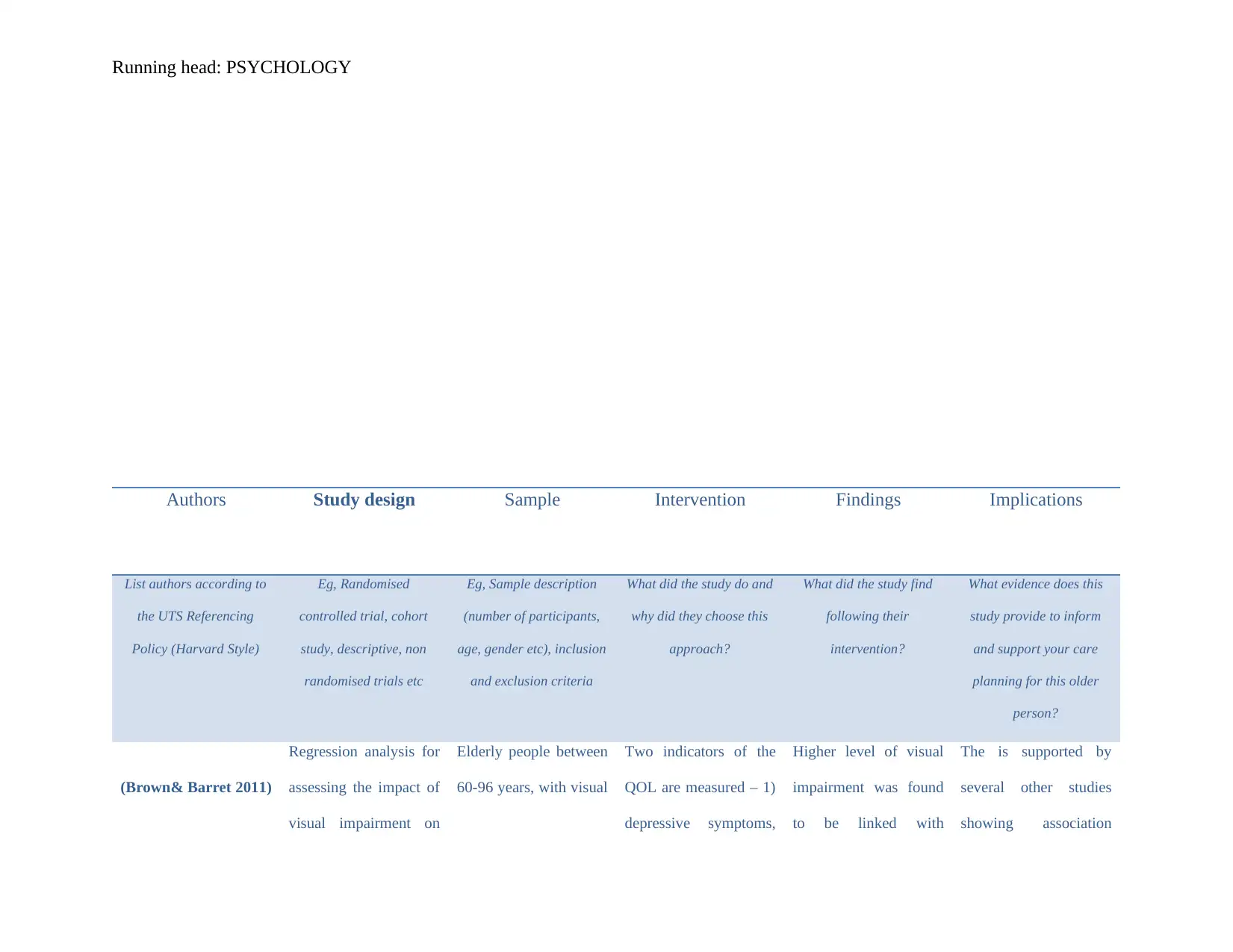
Running head: PSYCHOLOGY
Authors Study design Sample Intervention Findings Implications
List authors according to
the UTS Referencing
Policy (Harvard Style)
Eg, Randomised
controlled trial, cohort
study, descriptive, non
randomised trials etc
Eg, Sample description
(number of participants,
age, gender etc), inclusion
and exclusion criteria
What did the study do and
why did they choose this
approach?
What did the study find
following their
intervention?
What evidence does this
study provide to inform
and support your care
planning for this older
person?
(Brown& Barret 2011)
Regression analysis for
assessing the impact of
visual impairment on
Elderly people between
60-96 years, with visual
Two indicators of the
QOL are measured – 1)
depressive symptoms,
Higher level of visual
impairment was found
to be linked with
The is supported by
several other studies
showing association
Authors Study design Sample Intervention Findings Implications
List authors according to
the UTS Referencing
Policy (Harvard Style)
Eg, Randomised
controlled trial, cohort
study, descriptive, non
randomised trials etc
Eg, Sample description
(number of participants,
age, gender etc), inclusion
and exclusion criteria
What did the study do and
why did they choose this
approach?
What did the study find
following their
intervention?
What evidence does this
study provide to inform
and support your care
planning for this older
person?
(Brown& Barret 2011)
Regression analysis for
assessing the impact of
visual impairment on
Elderly people between
60-96 years, with visual
Two indicators of the
QOL are measured – 1)
depressive symptoms,
Higher level of visual
impairment was found
to be linked with
The is supported by
several other studies
showing association
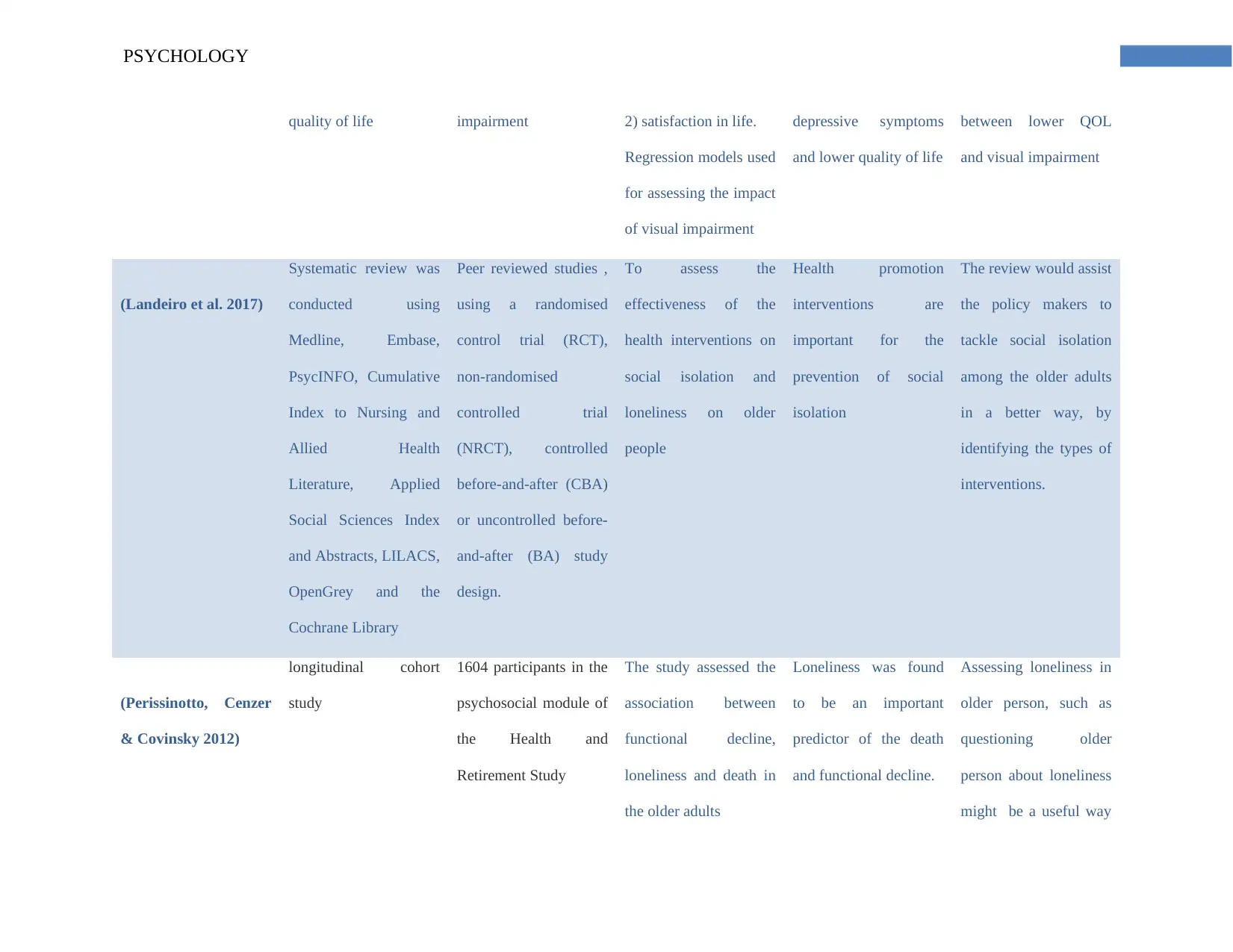
PSYCHOLOGY
quality of life impairment 2) satisfaction in life.
Regression models used
for assessing the impact
of visual impairment
depressive symptoms
and lower quality of life
between lower QOL
and visual impairment
(Landeiro et al. 2017)
Systematic review was
conducted using
Medline, Embase,
PsycINFO, Cumulative
Index to Nursing and
Allied Health
Literature, Applied
Social Sciences Index
and Abstracts, LILACS,
OpenGrey and the
Cochrane Library
Peer reviewed studies ,
using a randomised
control trial (RCT),
non-randomised
controlled trial
(NRCT), controlled
before-and-after (CBA)
or uncontrolled before-
and-after (BA) study
design.
To assess the
effectiveness of the
health interventions on
social isolation and
loneliness on older
people
Health promotion
interventions are
important for the
prevention of social
isolation
The review would assist
the policy makers to
tackle social isolation
among the older adults
in a better way, by
identifying the types of
interventions.
(Perissinotto, Cenzer
& Covinsky 2012)
longitudinal cohort
study
1604 participants in the
psychosocial module of
the Health and
Retirement Study
The study assessed the
association between
functional decline,
loneliness and death in
the older adults
Loneliness was found
to be an important
predictor of the death
and functional decline.
Assessing loneliness in
older person, such as
questioning older
person about loneliness
might be a useful way
quality of life impairment 2) satisfaction in life.
Regression models used
for assessing the impact
of visual impairment
depressive symptoms
and lower quality of life
between lower QOL
and visual impairment
(Landeiro et al. 2017)
Systematic review was
conducted using
Medline, Embase,
PsycINFO, Cumulative
Index to Nursing and
Allied Health
Literature, Applied
Social Sciences Index
and Abstracts, LILACS,
OpenGrey and the
Cochrane Library
Peer reviewed studies ,
using a randomised
control trial (RCT),
non-randomised
controlled trial
(NRCT), controlled
before-and-after (CBA)
or uncontrolled before-
and-after (BA) study
design.
To assess the
effectiveness of the
health interventions on
social isolation and
loneliness on older
people
Health promotion
interventions are
important for the
prevention of social
isolation
The review would assist
the policy makers to
tackle social isolation
among the older adults
in a better way, by
identifying the types of
interventions.
(Perissinotto, Cenzer
& Covinsky 2012)
longitudinal cohort
study
1604 participants in the
psychosocial module of
the Health and
Retirement Study
The study assessed the
association between
functional decline,
loneliness and death in
the older adults
Loneliness was found
to be an important
predictor of the death
and functional decline.
Assessing loneliness in
older person, such as
questioning older
person about loneliness
might be a useful way
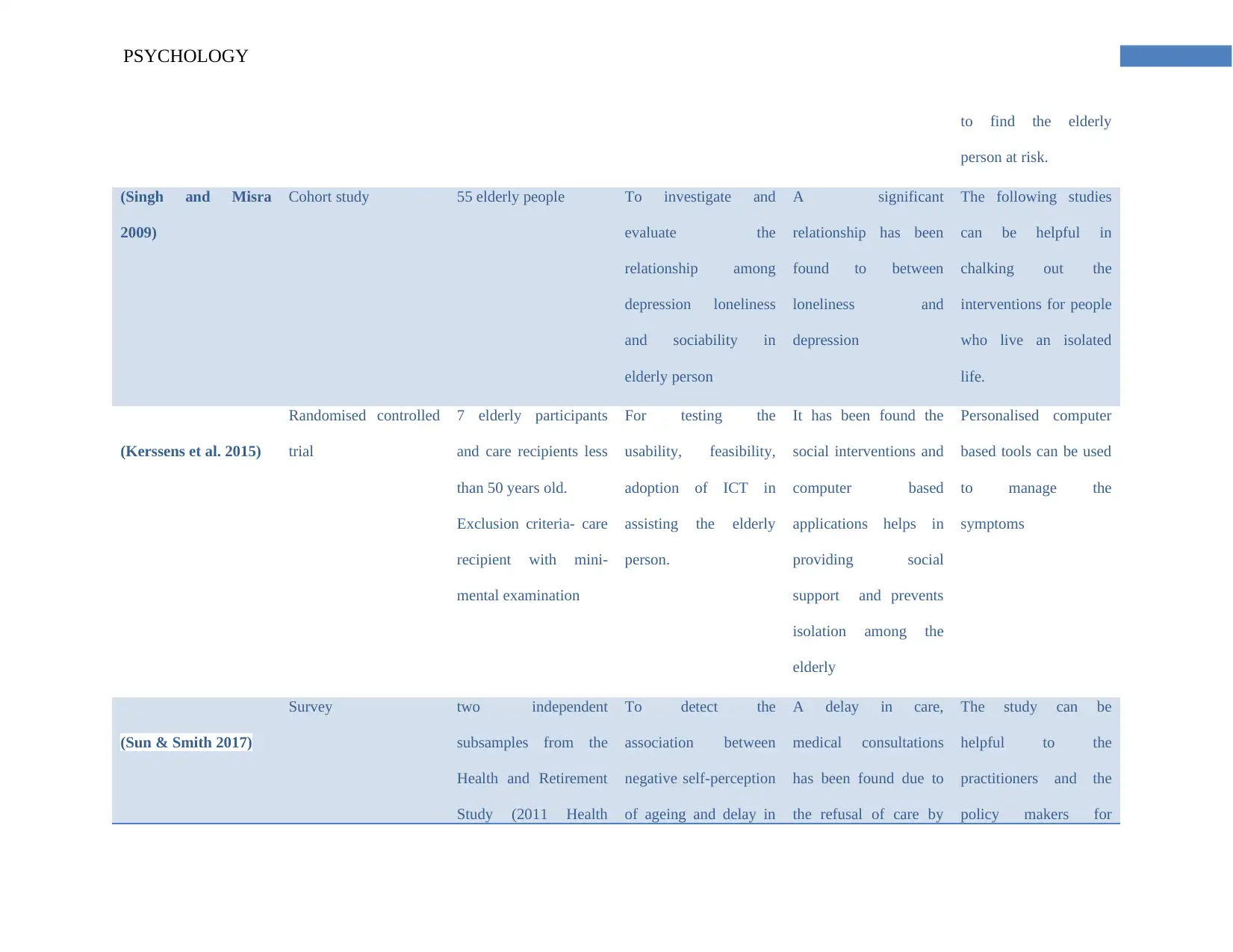
PSYCHOLOGY
to find the elderly
person at risk.
(Singh and Misra
2009)
Cohort study 55 elderly people To investigate and
evaluate the
relationship among
depression loneliness
and sociability in
elderly person
A significant
relationship has been
found to between
loneliness and
depression
The following studies
can be helpful in
chalking out the
interventions for people
who live an isolated
life.
(Kerssens et al. 2015)
Randomised controlled
trial
7 elderly participants
and care recipients less
than 50 years old.
Exclusion criteria- care
recipient with mini-
mental examination
For testing the
usability, feasibility,
adoption of ICT in
assisting the elderly
person.
It has been found the
social interventions and
computer based
applications helps in
providing social
support and prevents
isolation among the
elderly
Personalised computer
based tools can be used
to manage the
symptoms
(Sun & Smith 2017)
Survey two independent
subsamples from the
Health and Retirement
Study (2011 Health
To detect the
association between
negative self-perception
of ageing and delay in
A delay in care,
medical consultations
has been found due to
the refusal of care by
The study can be
helpful to the
practitioners and the
policy makers for
to find the elderly
person at risk.
(Singh and Misra
2009)
Cohort study 55 elderly people To investigate and
evaluate the
relationship among
depression loneliness
and sociability in
elderly person
A significant
relationship has been
found to between
loneliness and
depression
The following studies
can be helpful in
chalking out the
interventions for people
who live an isolated
life.
(Kerssens et al. 2015)
Randomised controlled
trial
7 elderly participants
and care recipients less
than 50 years old.
Exclusion criteria- care
recipient with mini-
mental examination
For testing the
usability, feasibility,
adoption of ICT in
assisting the elderly
person.
It has been found the
social interventions and
computer based
applications helps in
providing social
support and prevents
isolation among the
elderly
Personalised computer
based tools can be used
to manage the
symptoms
(Sun & Smith 2017)
Survey two independent
subsamples from the
Health and Retirement
Study (2011 Health
To detect the
association between
negative self-perception
of ageing and delay in
A delay in care,
medical consultations
has been found due to
the refusal of care by
The study can be
helpful to the
practitioners and the
policy makers for
Secure Best Marks with AI Grader
Need help grading? Try our AI Grader for instant feedback on your assignments.

PSYCHOLOGY
Care Mail Survey: N =
2,866; 2013 Health
Care and Nutrition
Study: N = 2,474 were
used for the survey
health care the elderly perception
due to their self-
perception about age
and health and self-
respect, about not
seeking external help.
taking a multifaceted
approach to reduce the
age stereotypes among
the older adults.
Care Mail Survey: N =
2,866; 2013 Health
Care and Nutrition
Study: N = 2,474 were
used for the survey
health care the elderly perception
due to their self-
perception about age
and health and self-
respect, about not
seeking external help.
taking a multifaceted
approach to reduce the
age stereotypes among
the older adults.

Running head: PSYCHOLOGY
1 out of 15
Related Documents
Your All-in-One AI-Powered Toolkit for Academic Success.
+13062052269
info@desklib.com
Available 24*7 on WhatsApp / Email
![[object Object]](/_next/static/media/star-bottom.7253800d.svg)
Unlock your academic potential
© 2024 | Zucol Services PVT LTD | All rights reserved.





